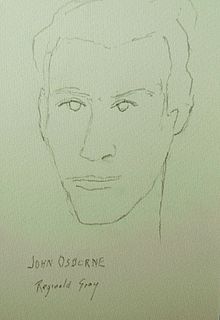John Osborne
English playwright (1929-1994)
John Osborne (12 December 1929 – 24 December 1994) was a British playwright, producer and actor. The first production of his play Look Back in Anger in 1956 revived British theatre and gave him prominence as one of the era's Angry Young Men.

Quotes
edit- Jimmy Porter: They spend their time mostly looking forward to the past.
- Look Back in Anger, Act II, sc. I (1956)
- George Dillon: [I]t's easy to answer the ultimate questions – it saves you bothering with the immediate ones.
- Epitaph for George Dillon, Act II (1957)
- Co-written with Anthony Creighton.
- This is a letter of hate. It is for you my countrymen, I mean those men of my country who have defiled it. The men with manic fingers leading the sightless, feeble, betrayed body of my country to its death.
- "A Letter To My Fellow Countrymen", Tribune (18 August 1961), as reprinted in The Independent (4 April 1994).
- Asking a working writer what he thinks about critics is like asking a lamppost what it feels about dogs.
- Quoted in Time magazine, October 31, 1977. [1]
- Also attributed to Christopher Hampton by the Sunday Times Magazine (16 October 1977)
The Entertainer (1957)
edit- Archie Rice: Don't clap too hard – it's a very old building.
- Number 7; said to have been an old joke in the music-halls at the time the play was written.
- Archie Rice: I'm dead behind these eyes. I'm dead, just like the whole inert, shoddy lot out there. It doesn't matter because I don't feel a thing, and neither do they.
- Number 8
- Archie Rice: Let me know where you're working tomorrow night and I'll come and see you.
- Number 13; this, the music-hall entertainer Archie Rice's acid farewell to his audience, also appears on Osborne's gravestone.
About Osborne
edit- John Osborne spoke out in a vein of ebullient, free-wheeling rancour that betokened the arrival of something new in the theatre – a sophisticated, articulate lower-class. Most of the critics were offended by Jimmy Porter, but not on account of his anger; a working-class hero is expected to be angry. What nettled them was something quite different: his self-confidence. This was no envious inferior whose insecurity they could pity.
- Kenneth Tynan, Tynan Right and Left (1967) p. 13